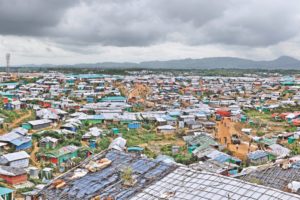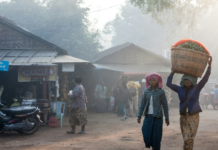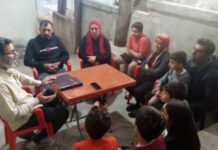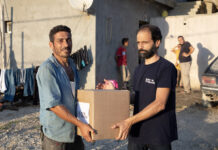
Cox Bazar, Bangladesh (ANS) – The SARS-COV-2 virus pandemic continues to spread misery around the world. Refugee populations live in close quarters. Social distancing is almost impossible. Yet refugees, like the 750,000 Rohingya hanging on to survival at Cox Bazaar, are now being blamed for the spread of the coronavirus. Humanitarian aid workers have been ordered to leave the camps and cease the delivery of non-essential services and supplies due to social distancing measures. The Rohingya do not understand why there is a cessation of aid delivery. It feels like abandonment by the aid community they said.
If NGOs stop providing assistance, we will die soon – no need for the Coronavirus to come. In this situation. We need more NGOs to help us but most are leaving.”
Security and Suspension of non-Essential Services
There are also reports of rapidly deteriorating security within the camps between Rohingya and host communities. A tube well was destroyed because it was near the edge of the camp. The host community did not want Rohingya to come close and repair it. Others have urged Rohingya to “close themselves within the camp” because they will spread diseases. Many aid workers see the Rohingya as posing a risk to themselves and others.
On 24 March 2020, the government of Bangladesh suspended non-essential services in all 34 Rohingya refugee camps in Cox’s Bazar. All shops and markets in the camps are closed and site management staff have been reduced by 50%. Non-essential programs suspended until further notice include all education, community centers, and training facilities. The distribution of shelter kits and material, as well as registration processes, are also suspended for at least 15 days. Essential services that will remain open and staffed include information and awareness related to COVID-19, health and nutrition facilities, distribution of food, as well as WASH activities (RRRC, 24/03/2020).
NGO’s Suspended From Working in the Camps
The Bangladesh foreign minister confirmed that on Thursday they suspended six projects of NGO Mukti’s Cox’s Bazar branch following allegations that it made sharp weeding tools for distribution among Rohingyas. That day, the minister had said action would be taken against the NGOs operating in Rohingya camps if evidence was found that they were doing things they were not supposed to do. (Ed. note – This means unapproved activities that help the Rohingya. Bangladesh is under pressure from its neighbor Myanmar to not assist the Rohingya.)
Hundreds of thousands of Rohingyas have fled decades of systematic discrimination, statelessness and targeted violence in Rakhine State in Myanmar. Over 743,000 of them fled military atrocities including killings, rapes, tortures, and burning of houses in the Rakhine State since August 25, 2017. They joined the 300,000 others who had reached Bangladesh before.
Almost all Rohingyas have taken shelter in refugee camps in Cox’s Bazar and have been living on humanitarian assistance provided by the Bangladesh government and international and national aid groups.






